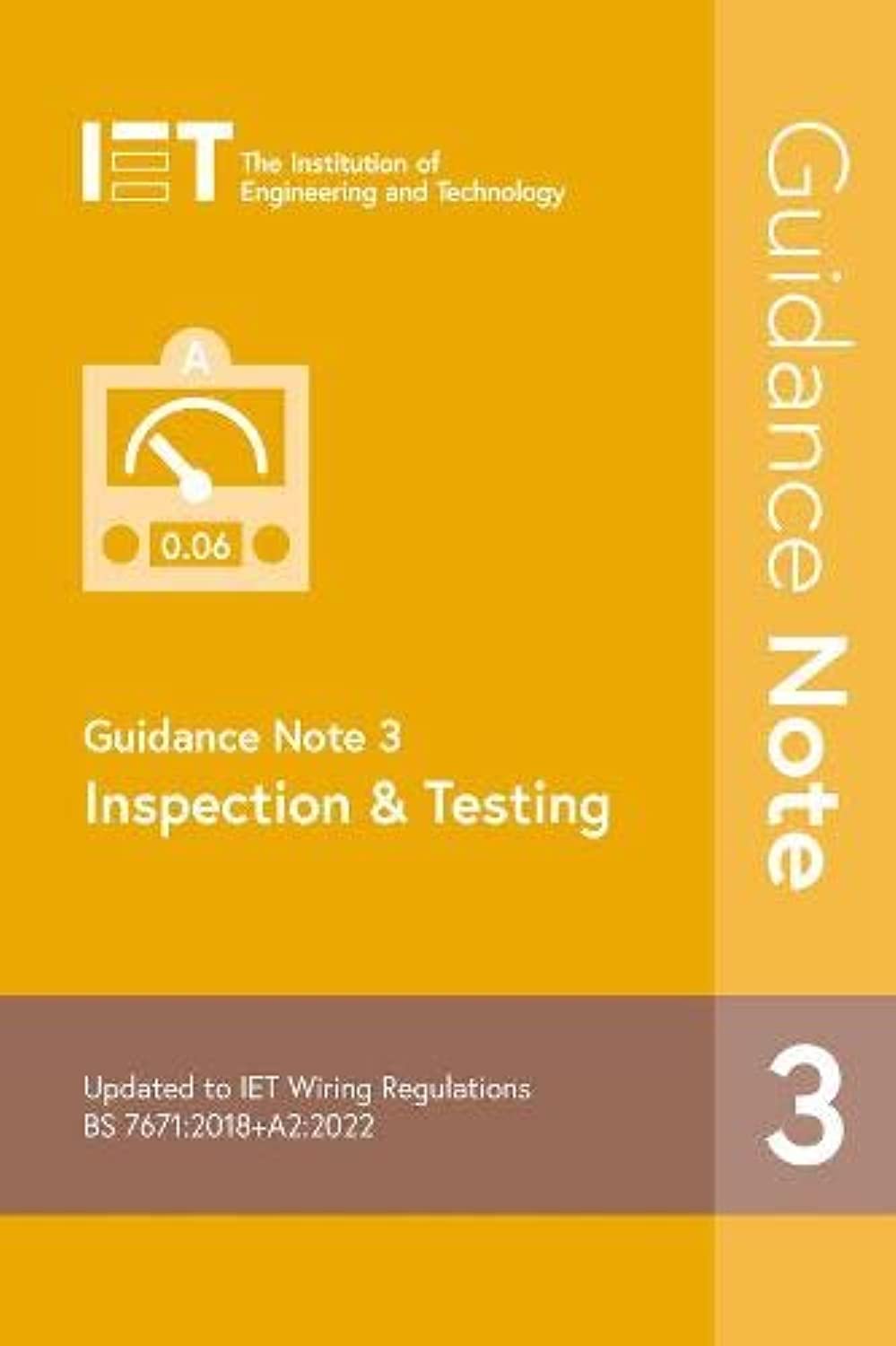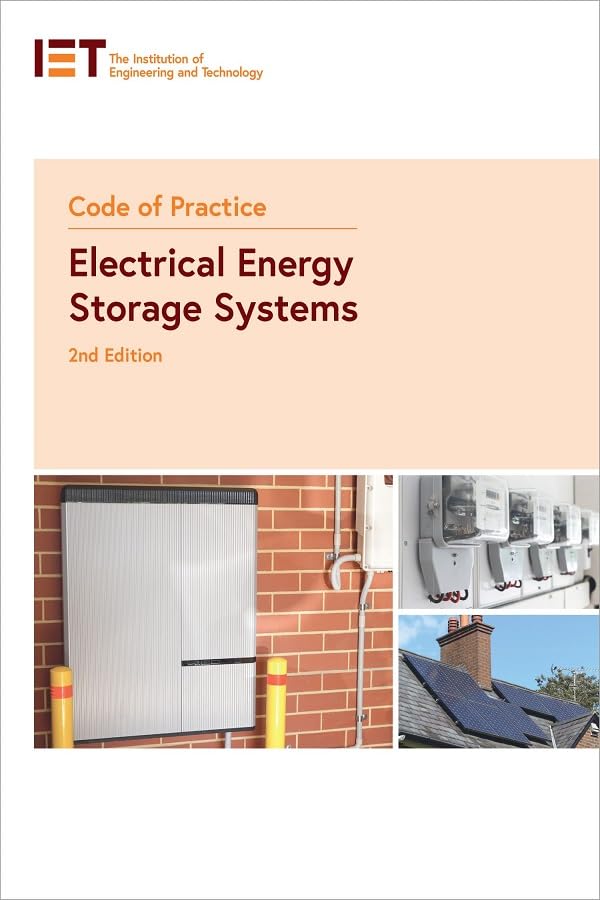Books and Downloads

|
BS 7671:2018+A2:2022 IET Wiring RegulationsThe IET Wiring Regulations is the national standard to which all domestic and industrial wiring must conform. It is essential to all those concerned with the design, installation and maintenance of electric wiring in buildings. |
 |
On-Site Guide (BS 7671:2018+A2:2022)The On-Site Guide is an essential guide to BS 7671. It incorporates the extensive changes in BS 7671:2018, making this a vital guide for keeping up to date. It enables the competent electrician to deal with installations (up to 100 A, 3-phase) providing essential information in a convenient, easy-to-use format. |
 |
Student's Guide to the IET Wiring RegulationsThe Student's Guide to the IET Wiring Regulations is designed for students studying for a career in the electrotechnical industry. The content will enhance the reader's understanding of the IET Wiring Regulations and how to interpret them, as well as integrating with current qualifications being delivered. The simple format, using diagrams and examples, provides students with guidance to navigate their way through the information available in BS 7671 while studying electrical courses. |
 |
Guidance Note 3: Inspection & TestingGuidance Note 3: Inspection & Testing is a fundamental guidance book for all those involved with the testing and inspection of electrical installations. It also contains essential guidance for those studying for inspection and testing qualifications and has been fully updated to BS 7671:2018:2022. |
 |
Electrician's Guide to the Building RegulationsElectrician's Guide to the Building Regulations includes the latest guidance on third-party certification schemes and covers relevant parts of the Building Regulations, including Fire Safety, Ventilation and Conservation of Energy. This guide has been fully updated to BS 7671:2018+A2:2022. |
|
|
Codebreakers: a Guide to Coding Observations for Electrical Installation Condition Reports (EICRs)NAPIT EICR Codebreakers Book - updated for Amendment 2 EICR Codebreakers Book -A must have for every electrician -A NAPIT publication with guidance on the coding of observations made during EICR inspections. |
 |
Code of Practice for In-service Inspection and Testing of Electrical EquipmentThis Code of Practice provides guidance on in-service inspection and testing to determine whether electrical equipment is safe for continued use. Duty-holders are required by law to consider the risks associated with the use of electrical equipment. The Code underpins the need to conduct inspection and testing of electrical equipment by considering the risks the equipment is exposed to and the environment it is used in, in addition to the skill level of the user. It applies to all workplaces and also some types of rented accommodation. |
 |
Code of Practice for Electric Vehicle Charging Equipment InstallationThis well established and authoritative IET Code of Practice provides a clear explanation of electric vehicle charging equipment and installation. It sets out the considerations and planning needed in advance and the necessary physical and electrical requirements during the installation process. It also details what needs to be considered when undertaking electrical work on charging equipment in various different locations - such as domestic dwellings, on-street locations, and commercial and industrial premises. |
 |
Code of Practice for Grid-connected Solar Photovoltaic SystemsThis Code of Practice sets out the requirements for the design, specification, installation, commissioning, operation, and maintenance of grid-connected solar photovoltaic (PV) systems. |
 |
Code of Practice for Electrical Energy Storage SystemsElectrical Energy Storage Systems (EESS) provide storage of electrical energy so that it can be used later. EESS may be installed for a variety of reasons, for example increasing the 'self-consumption' of buildings fitted with renewable energy systems; arbitrage services; ancillary services and providing a back-up or alternative power supply. |
 |
GS38This guidance note is aimed at people (including electricians, electrical contractors, test supervisors, technicians, managers, tradespeople and/or appliance retailers/repairers etc) who use electrical test equipment on low voltage electrical systems and equipment. |
 |
Best Practice Guide 4: Electrical installation condition reporting (EICR)How to use the classification codes (C1, C2, C3, FI) which need to be attributed to each observation recorded during the periodic inspection and testing of an electrical installation, taking into account requirements of BS 7671. Although focused on the likely observations associated with domestic and similar electrical installations, this guidance can be applied to similar situations in other types of installation. |
Best Practice Guide 2: Safe isolation proceduresExplains what needs to be done to make sure workers on site are not exposed to danger when working on or near live electrical systems and equipment in buildings, particularly in the final stages of construction, electrical installation, inspection and testing work. Many accidents are a direct consequence of electricians not implementing safe isolation procedures on AC low voltage installations (those not exceeding 1000 V AC between conductors). |
|
 |
HSR25: The Electricity at Work Regulations 1989HSR25 will help dutyholders meet the requirements of the Electricity at Work Regulations 1989. It will be of interest and practical help to all dutyholders, particularly engineers (including those involved in the design, construction, operation or maintenance of electrical systems), technicians and their managers. |
